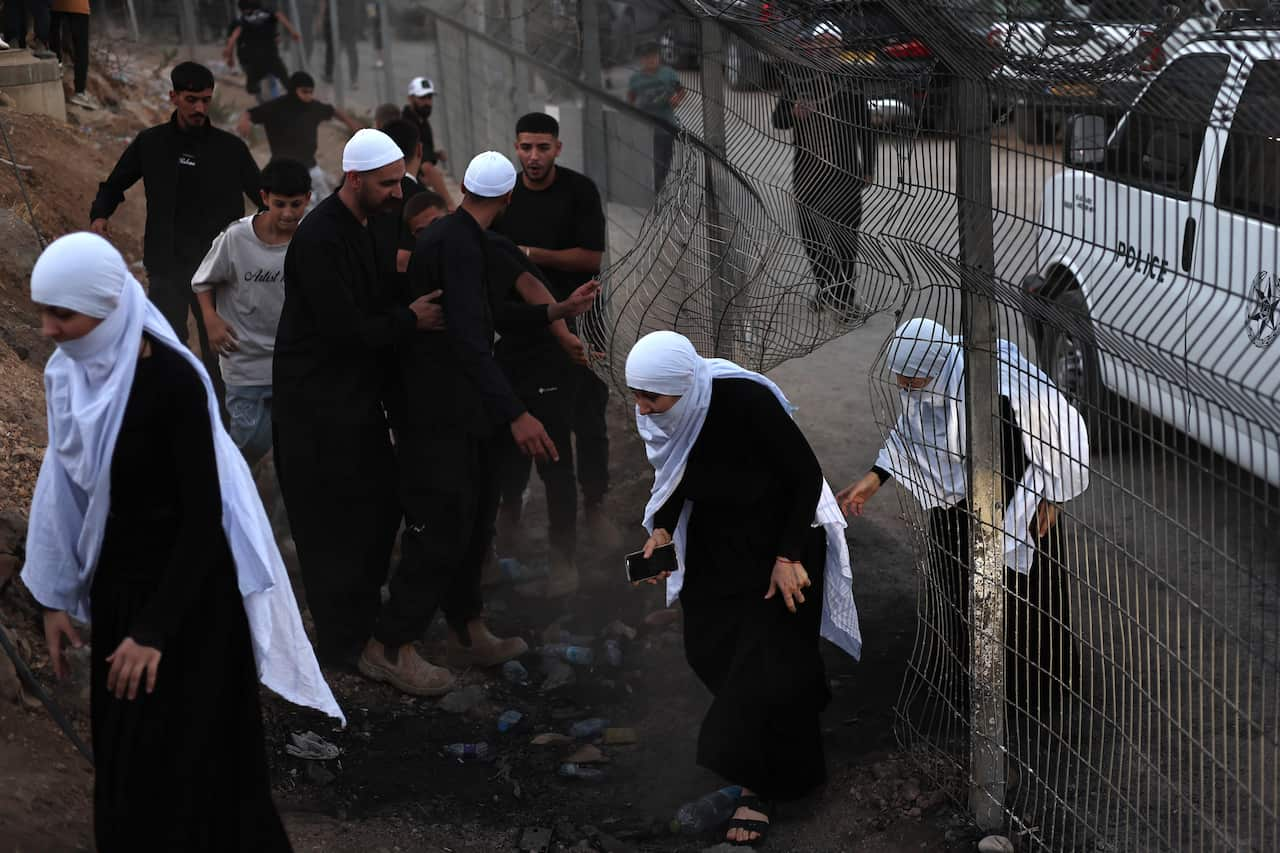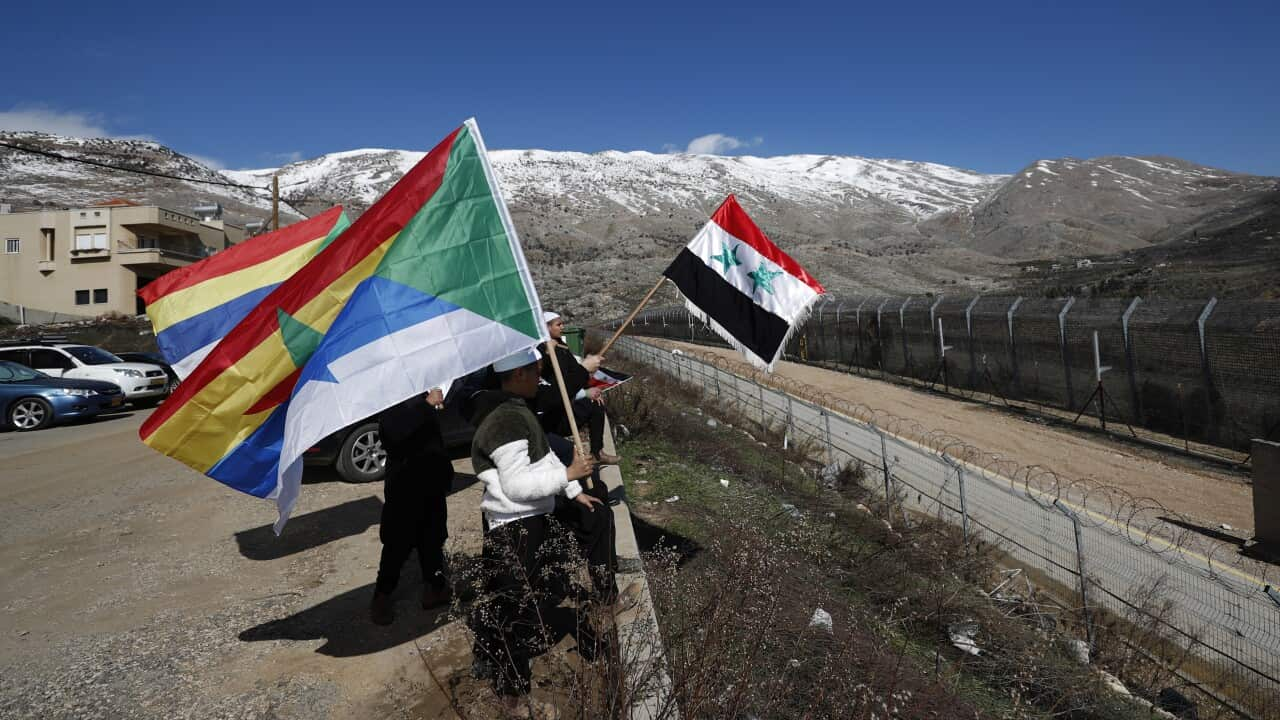Israel says it's striking Syria to defend the Druze, a minority group with longstanding roots in the region and a history of tensions on its doorstep.
Clashes erupted on Sunday between factions from the Druze religious minority and Bedouin tribes in southern Syria, leaving over 100 people dead — prompting Syrian forces to intervene.
That, in turn, triggered renewed Israeli airstrikes, including in the Syrian capital Damascus.
Israeli Prime Minister Benjamin Netanyahu said his government is "committed to preventing harm to the Druze in Syria" and is "acting to prevent the Syrian regime from harming them".
He said Israel wants to "ensure the demilitarisation of the area adjacent to" their border in southern Syria.
While the Druze population is primarily concentrated in Sweida, Israeli strikes have extended beyond the region — damaging the defence ministry headquarters and the area near the presidential palace in Damascus.
Israel's claim that it is striking Syria to protect the Druze is challenged by most who belong to the minority group outside of Israel.
Who are the Druze?
The Druze are a religious minority group with a population of about one million, located in Syria, Lebanon, Jordan, and Israel.
The faith originated in Egypt during the 11th century and practices an offshoot of Islam. However, most followers do not identify themselves as Muslims.
With approximately 700,000 as of the early 2020s, Syria has the largest Druze population in the world. Most of them live in the country's south, around Sweida, close to the Israeli-occupied Golan Heights.
The Golan Heights were captured by Israel from Syria during the Six-Day War in 1967.
Israel also has a sizeable Druze community of approximately 140,000 people, primarily residing in the northern regions.
Unlike other Arab Israelis, some Druze serve in Israel's defence forces.

Druze men over 18 have reportedly been conscripted into the Israeli military since 1957 and often rise to high-ranking positions, while many serve in the police and security forces.
About 20,000 Druze live in the Golan Heights, alongside 25,000 Israeli settlers.
But the vast majority of Druze living in the Golan Heights consider themselves Syrian, with only around 1,600 taking up the offer of Israeli citizenship.
Why does Israel say it's protecting them?
Since the collapse of the Bashar al-Assad regime in Syria, there have been reports of tensions between pro-government forces and Druze militias.
Syria's Islamist authorities have had strained relations with the country's religious and ethnic minorities, and have been accused of not doing enough to protect them.
The recent tensions started with conflicts between Druze religious minority factions and Sunni Bedouin tribes, leading to more than 100 deaths.
Syrian government forces sent reinforcements to the region in the country's south, saying it wants to restore security.
But witnesses said the government forces had joined the Bedouin in attacking Druze fighters and civilians.
In response, Israel launched attacks on Syrian government forces moving towards Sweida, saying it was protecting the Druze minority there.
Sheikh Mowafaq Tarif, the spiritual leader of Israel's Druze community, described the situation as "an existential battle for the Druze community".
Before the attacks expanded to airstrikes on Damascus, Israel's defence minister, Israel Katz, said these attacks would continue until Syrian government forces "withdraw from the area".
"[Israel] will also soon raise the bar of responses against the regime if the message is not understood," he said.
But Druze in Syria have generally rejected intervention by Israel.
"We are not asking for protection from anyone, and we won't ask for protection from anyone," Rabih Munthir, a Druze leader in southern Syria, told The New York Times earlier this year.
Some Druze politicians outside Syria have said Israel's motivation is "not protecting the Druze in Sweida, as it claims".
"But rather [Israel] is using some local leaders to justify its interventions under this pretext," Walid Jumblatt, a Druze Lebanese politician and former militia commander, told Syrian media.
Israel is also believed to have broader strategic interests in supporting the minority group, including backing a federal vision for Syria.
Israeli foreign minister Gideon Sa'ar said in December 2024: "Thinking Syria will be a single country with effective control and sovereignty over its entire territory is unrealistic.
"The logical thing is to strive for autonomy for the various minorities in Syria, perhaps with a federal structure. This is something the international community will have to consider."
Syria's interim President Ahmed al-Sharaa vowed on Thursday that those behind violence against the Druze minority would be held accountable.
"We are keen on holding accountable those who transgressed and abused our Druze people, as they are under the protection and responsibility of the state," Sharaa said in a televised address.
The Syrian government announced on Wednesday a new ceasefire in Sweida and a halt to military operations there, saying the army had begun withdrawing from the Druze-majority city.
— With additional reporting by Agence France-Presse
Correction: A previous version of this article made reference to Jewish settlers in Syria. This has been changed to Israeli settlers.
For the latest from SBS News, download our app and subscribe to our newsletter.

